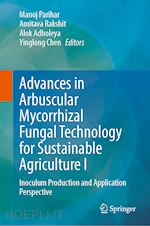
Questo prodotto usufruisce delle SPEDIZIONI GRATIS
selezionando l'opzione Corriere Veloce in fase di ordine.
Pagabile anche con Carta della cultura giovani e del merito, 18App Bonus Cultura e Carta del Docente
Arbuscular mycorrhizal symbiosis: from infection signaling to bidirectional nutrient exchanges.- Advances in AMF research: Isolation, histochemical staining, enumeration, morphological and molecular techniques.- Improved DNA extraction methods and PCR primes for assessing AMF diversity and distribution in agro-ecosystem.- Identifying and selecting indigenous Arbuscular Mycorrhizal Fungi for field Application.- Substrate based and substrate free In-vivo production technologies of AMF.- In vitro Production of Arbuscular Mycorrhizal Fungi: An overview.- Low cost technologies for AMF inoculum production using various agro-wastes and other byproducts.- Development and management of arbuscular mycorrhizal fungi inocula for smallholder farmers: challenges and opportunities.- New formulations, product development and commercialization of Arbuscular Mycorrhizal fungi.- Arbuscular mycorrhizal fungi in the field: Triumphs and failures.- Challenges in application of arbuscular mycorrhizal inocula in conventional agriculture.- Abiotic Environmental factors influencing Distribution and Behavior arbuscular mycorrhizal fungi (AMF).- Importance of AMF in the determination of species composition and diversity distribution of various ecosystem under different habitats.- Functional practical importance of AMF mixed inoculants for plant growth and adaption.- Application of AMF under continuous and diverse fertilization regime: case studies.- Arbuscular Mycorrhizal: Physiology of symbiosis and application towards sustainability.- Production methods of arbuscular mycorrhizal fungal inoculum: challenges and future perspectives.
Dr. Manoj Parihar
Scientist, ICAR-Vivekananda Parvatiya Krishi AnusandhanSansthan, India
Dr. Manoj Parihar is currently working at ICAR-VPKAS, Almora as a Soil Scientist in Crop Production Division. His present research works extend to study the diversity and distribution of AM fungi in North-Western Himalayan region, long term fertilizer assessment in the rainfed and irrigated soybean-wheat cropping system, soil health management under organic farming and various agroforestry systems.
Dr. Amitava Rakshit
Associate Professor, Department of Soil Science and Agricultural Chemistry, Institute of Agricultural Sciences, Banaras Hindu University (BHU), IndiaAmitava Rakshit, an IIT-Kharagpur alumnus, is presently Senior Associate Professor at the Department of Soil Science and Agricultural Chemistry at Institute of Agricultural Sciences, Banaras Hindu University. Dr. Rakshit worked in the Department of Agriculture, Government of West Bengal in administrationand extension roles. He has visited Scandinavia, Europe, Africa, UAE, and Bangladesh pertaining to his research work and presentation. He was awarded with TWAS Nxt Fellow (Italy), Biovision Nxt Fellow (France), Darwin Now Bursary (British Council, UK), Young achiever award, Shastri Indo-Canadian Institute award, and Best Teacher’s Award at UG and PG level by BHU-ICAR, state level by Uttar Pradesh Academy of Agricultural Sciences,
and national level by All India Agricultural Students Association in 2009, 2012, 2018, and 2019, respectively. He is serving as review college member of British Ecological Society, London since 2011, member of Global Forum on Food Security and Nutrition of FAO, Rome, and Commission on Ecosystem Management of IUCN. He has published 105 research papers, 49 book chapters, 28 popular articles, and 3 manuals, and authored 29 books for Springer,Elsevier, and CRC Press.Dr. Alok Adholeya
Program Director, Sustainable Agriculture, IHC, TERI, India
Dr. Alok Adholeya has over 35 years’ significant experience and expertise in the area of translational research and reaching out to millions of common people worldwide through his developed technologies which includes, a new biological organisms for soil fertility and crop productivity enhancement known as “Mycorrhizal” bioremediation of industrial solid waste aeron chemical and fertilizer industries, He has developed more than 25 IPR’s and commercialized most of them through technology transfer to industries. His current involvement in the area of nano intervention in agriculture, micro encapsulation technology developed for beneficial yet fragile microorganisms and seed coating technology are few which are making inroads to benefit mankind.Dr. Yinglong Chen
ARC Future Fellow and research professor, School of Agriculture and Environment, The University of Western Australia, Australia
Dr. Yinglong Chen has 30 years research experience with research focusing on the structure and functions of plant roots and rhizosphere interactions. He has published four scholarly textbooks in mycorrhiza and over 280 journal articles.










Il sito utilizza cookie ed altri strumenti di tracciamento che raccolgono informazioni dal dispositivo dell’utente. Oltre ai cookie tecnici ed analitici aggregati, strettamente necessari per il funzionamento di questo sito web, previo consenso dell’utente possono essere installati cookie di profilazione e marketing e cookie dei social media. Cliccando su “Accetto tutti i cookie” saranno attivate tutte le categorie di cookie. Per accettare solo deterninate categorie di cookie, cliccare invece su “Impostazioni cookie”. Chiudendo il banner o continuando a navigare saranno installati solo cookie tecnici. Per maggiori dettagli, consultare la Cookie Policy.